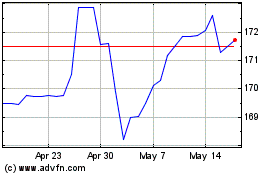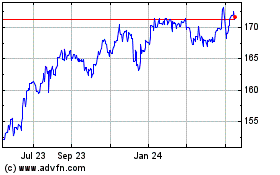Commodity Currencies Slide On Weak Asian Shares
November 26 2023 - 10:23PM
RTTF2
Commodity currencies such as the Australia, the New Zealand and
the Canadian dollars weakened against their major currencies in the
Asian session on Monday, as investor sentiment remained cautious
amid concerns about interest rates and the impact of higher
borrowing costs on global economic growth.
Traders are reluctant to make significant moves as they await
key economic data from the U.S., China and Europe for additional
clues about the outlook for interest rates.
Traders also cautiously await domestic inflation data later in
the week that will provide cues on the outlook for interest
rates.
Crude oil prices fell sharply, with traders waiting on a crucial
OPEC meeting this week as oil producers struggling to come to a
consensus on production levels. West Texas Intermediate Crude oil
futures for January ended lower by $1.56 or 2 percent at $75.54 a
barrel.
In the Asian trading today, the Australian dollar fell to a
4-day low of 97.81 against the yen, from last week's closing value
of 98.36. The aussie may test support near the 95.00 region.
Against the euro, the aussie dropped to a 5-day low of 1.6667
from a recent near 3-week high of 1.6593. On the downside, 1.69 is
seen as the next support level for the aussie.
Moving away from a recent near 4-month high of 0.6595 against
the U.S. dollar, the aussie edged down to 0.6566. If the aussie
extends its downtrend, it is likely to find support around the 0.63
area.
The NZ dollar fell to 4-day lows of 90.28 against the yen and
1.8055 against the euro, from last week's closing quotes of 90.73
and 1.8004, respectively. If the kiwi extends its downtrend, it is
likely to find support around 87.00 against the yen and 1.82
against the euro.
Against the U.S. and the Australian dollars, the kiwi edged down
to 0.6061 and 1.0844 from Friday's closing quotes of 0.6071 and
1.0833, respectively. The kiwi may test support near 0.58 against
the greenback and 1.09 against the aussie.
The Canadian dollar fell to 109.00 against the yen and 1.4952
against the euro, from Friday's closing quotes of 109.57 and
1.4915, respectively. If the loonie extends its downtrend, it is
likely to find support around 107.00 against the yen and 1.50
against the euro.
Against the U.S. and the Australian dollars, the loonnie dropped
to 1.3662 and 0.8990 from last week's closing quotes of 1.3635 and
0.8975, respectively. The loonie may test support near the 1.38
against the greenback and 0.90 against the aussie.
Meanwhile, the safe-haven currency, the yen rose against other
major currencies amid risk aversion.
The yen rose to 4-day highs of 148.90 against the U.S. dollar
and 168.76 against the Swiss franc, from last week's closing quotes
of 149.44 and 169.28, respectively. The yen may test resistance
around 147.00 against the greenback and 166.00 against the
franc.
Against the euro and the pound, the yen climbed to 162.94 and
187.61 from Friday's closing quotes of 163.47 and 188.34,
respectively. If the yen extends its uptrend, it is likely to find
resistance around 160.00 against the euro and 184.00 against the
pound.
Looking ahead, U.S. final building permits and new home sales
data, both for October and U.S. Dallas Fed manufacturing index for
November, are due to be released in the New York session.
At 9:00 am ET, European Central Bank President Christine Lagarde
is set to speak at a conference in Brussels, Belgium.
CHF vs Yen (FX:CHFJPY)
Forex Chart
From Jun 2024 to Jul 2024

CHF vs Yen (FX:CHFJPY)
Forex Chart
From Jul 2023 to Jul 2024
